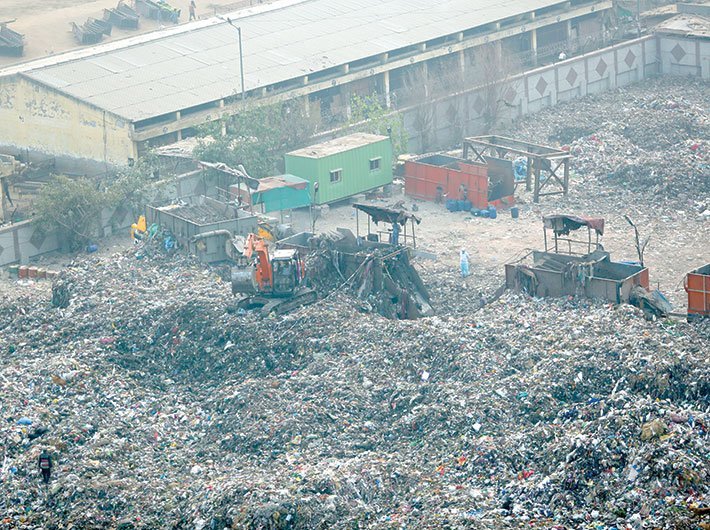With SWM industry expected to double in five years and become worth Rs 9,800 crore, stock market seems to have appreciated the role of a firm like Antony Waste Handling Cell
Antony Waste Handling Cell (AWHC) has been offering its services in handling municipal solid waste (MSW) across India for the past 19 years. When AWHC made its initial public offer (IPO) during December 21-23, it was subscribed 15 times. Why the sudden interest in this IPO? Did the market rightly and expediently recognise the immense potential of the stock?
The issue of MSW
India generates nearly 150,000 tonnes of MSW per day. The World Bank projects that this number will more than double to reach 377,000 tonnes by 2025. The monstrous amount of waste, if left untreated, emanates negative externalities in the environment. About 77% of this waste is either dumped in an isolated landfill near the city (making its way into the ground and rivers) or incinerated (contributing to the already dire state of air pollution in India). These strategies are not sustainable for the long term.
Construction of waste-to-energy (WTE) plants is considered an ideal way to manage MSW as these undertake the process of segregation and recycling of waste before being converted into renewable energy. However, currently there are only seven WTE plants in India and are reported to be running at a sub-optimal level. With the conclusion of the Swachh Bharat Mission (SBM) and declaration of India as an open defecation free (ODF) nation, the importance of tackling MSW gains further traction.
Government reforms till date
New rules for solid waste management (SWM) were introduced in 2016. These encourage the construction and use of WTE plants through the provision of adequate subsidies or incentives. There is also provision for integration of informal workers like ragpickers and kabadiwalas in the formal sector. There is a mention of zero tolerance toward dumping and burning any form of waste in the open public spaces. Most importantly, the rules mandate segregation of waste at source into biodegradables, dry waster (paper, plastic, etc.), and domestically hazardous waste (sanitary napkins, diapers, mosquito repellants, etc.). Finally, it led to the establishment of a central agency to monitor the implementation of 2016 SWM rules. However, the efficacy of this establishment is often put to question as 2016 SWM rules do not enlist imposition of penalties in case of poor implementation.
Way forward: corporate collaboration
In recognition of the rising burden of MSW and the lack of strong policy initiatives, the ministry of housing and urban affairs has begun drafting SBM 2.0 that moves beyond OD and solely addresses the challenges of SWM in India. However, the government alone cannot shoulder the entire burden of resolving this issue. Private sector participation has a key role to play.
Given the current state of overflowing landfills in India and the lack of segregation of MSW in those landfills, it would appeal to involve the private sector along each step of the value chain of SWM activities, i.e., right from collection and segregation to treatment and disposal. Firms like AWHC already specialise in landfill management and operation of the WTEs. The government stands to gain substantially by leveraging on the expertise of the firms. Further, unlike OD, toilet use leads to the containment of feces. With India on track to being an ODF nation, the management of an unprecedented generation of fecal sludge both in rural and urban areas will prove to be a challenge.
These firms have the potential to innovate and invest in facilities that can manage the value chain of fecal sludge management. For example, Kabadiwalla Connect is an MSW management company based in Chennai that capitalises on the existing informal workers in the sector and provides a virtual platform to connect kabadiwallas with the waste generators. A similar platform can be developed to hire cleaners to empty the pits that will get full from regular toilet use. Hence, the advantage of the partnership with the corporates will go beyond the mere financial gain as they also bring in years of expertise, requisite technology, and the skills in optimising the activities of MSW management.
The national policies are orienting towards handling the issues in SWM. With the anticipation of growing private sector participation in managing these issues, businesses like AHWC are expected to flourish. An estimate suggests that the SWM industry is expected to double in the coming five years and become worth Rs 9,800 crore. It is in this context that the stock market seems to have appreciated the growing role of AWHC in helping India move beyond an ODF India to become a clean India.
Equipping people to lead the change
Just as SBM recognised the importance of behavioural change interventions in ensuring sustained adoption, the strategies designed to tackle the looming concerns of MSW should also inculcate this element. Propagation of media campaigns that explain the technique of optimal management of MSW by prominent Indian celebrities will have a lasting impact on the audience. In a similar vein, conducting community drives that explain the proper procedure to sort waste at the household level, for example, separating dry waste from biodegradable and hazardous waste, will go a long way in reducing the burden of segregating MSW. The focus on reducing the generation of waste and efforts to undertake recycling has bypassed any policy prescription. Inculcating the habit of consuming less, reusing what one can and recycling that cannot be reused will significantly lower per capita waste production. Lastly, continued efforts to sensitise the residents to demand better cities, will bring about a sustained change in managing MSW.
Solving the crisis of MSW demands urgent public policy attention and strong political will. This needs to be complemented with the space for the private sector to participate and sustained efforts to build and maintain a clean living environment by the residents.
Seth is consultant at Tata-Cornell Institute, Cornell University, USA, a PhD scholar at Bennett University. Views are personal.
